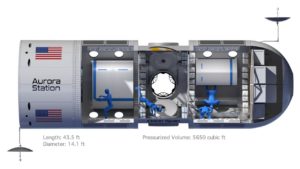Well-heeled space tourists will have a new orbital destination four years from now, if one company’s plans come to fruition.
That startup, called Orion Span, aims to loft its “Aurora Station” in late 2021 and begin accommodating guests in 2022.
“We are launching the first-ever affordable luxury space hotel,” said Orion Span founder and CEO Frank Bunger, who unveiled the Aurora Station idea today (April 5) at the Space 2.0 Summit in San Jose, California. [Aurora Station: A Luxury Space Hotel in Pictures]

“Affordable” is a relative term: A 12-day stay aboard Aurora Station will start at $9.5 million. Still, that’s quite a bit less than orbital tourists have paid in the past. From 2001 through 2009, seven private citizens took a total of eight trips to the International Space Station (ISS), paying an estimated $20 million to $40 million each time. (These private missions were brokered by the Virginia-based company Space Adventures and employed Russian Soyuz spacecraft and rockets.)
“There’s been innovation around the architecture to make it more modular and more simple to use and have more automation, so we don’t have to have EVAs [extravehicular activities] or spacewalks,” Bunger said of Aurora Station.

“The goal when we started the company was to create that innovation to make simplicity possible, and by making simplicity possible, we drive a tremendous amount of cost out of it,” he told Space.com. [In Pictures: Private Space Stations of the Future]
Orion Span is building Aurora Station itself, Bunger added. The company — some of whose key engineering players have helped design and operate the ISS — is manufacturing the hotel in Houston and developing the software required to run it in the Bay Area, he said.
Aurora Station will be about the size of a large private jet’s cabin. It’ll measure 43.5 feet long by 14.1 feet wide (13.3 by 4.3 meters) and feature a pressurized volume of 5,650 cubic feet (160 cubic m), Orion Span representatives said. For comparison, the ISS is 357 feet (109 m) long and has an internal pressurized volume of 32,333 cubic feet (916 cubic m).

The private outpost will orbit at an altitude of 200 miles (320 kilometers) — a bit lower than the ISS, which is about 250 miles (400 km) above Earth on average. Right now, it’s unclear how Aurora Station and its future occupants will get to orbit; Orion Span has yet to confirm any deals with launch providers, Bunger said.
Aurora Station will accommodate four paying guests and two crewmembers; these latter personnel will likely be former astronauts, Bunger said. Most of the guests will probably be private space tourists, at least initially, but Orion Span will be available to a variety of customers, including government space agencies, he added.
And the space hotel will get bigger over time, if everything goes according to plan. As demand grows, Orion Span will launch additional modules to link up with the original core outpost, Bunger said.
“Our long-term vision is to sell actual space in those new modules,” he said. “We’re calling that a space condo. So, either for living or subleasing, that’s the future vision here — to create a long-term, sustainable human habitation in LEO [low Earth orbit].”
Orion Span isn’t alone in seeking to carve out this path. Several other companies, including Axiom Space and Bigelow Aerospace, also aim to launch commercial space stations to Earth orbit in the next few years to meet anticipated demand from space tourists, national governments, researchers and private industry. (Other private players, including Virgin Galactic and Blue Origin, are developing vehicles to take paying customers to and from suborbital space, and are scheduled to begin commercial operations soon.)
If you’ve got $80,000 to spare, you can put a (fully refundable) deposit down on an Aurora Station stay beginning today. Folks who fly up will undergo a three-month training program, the last portion of which will occur aboard the space hotel itself, Bunger said. To learn more, go to www.orionspan.com.


